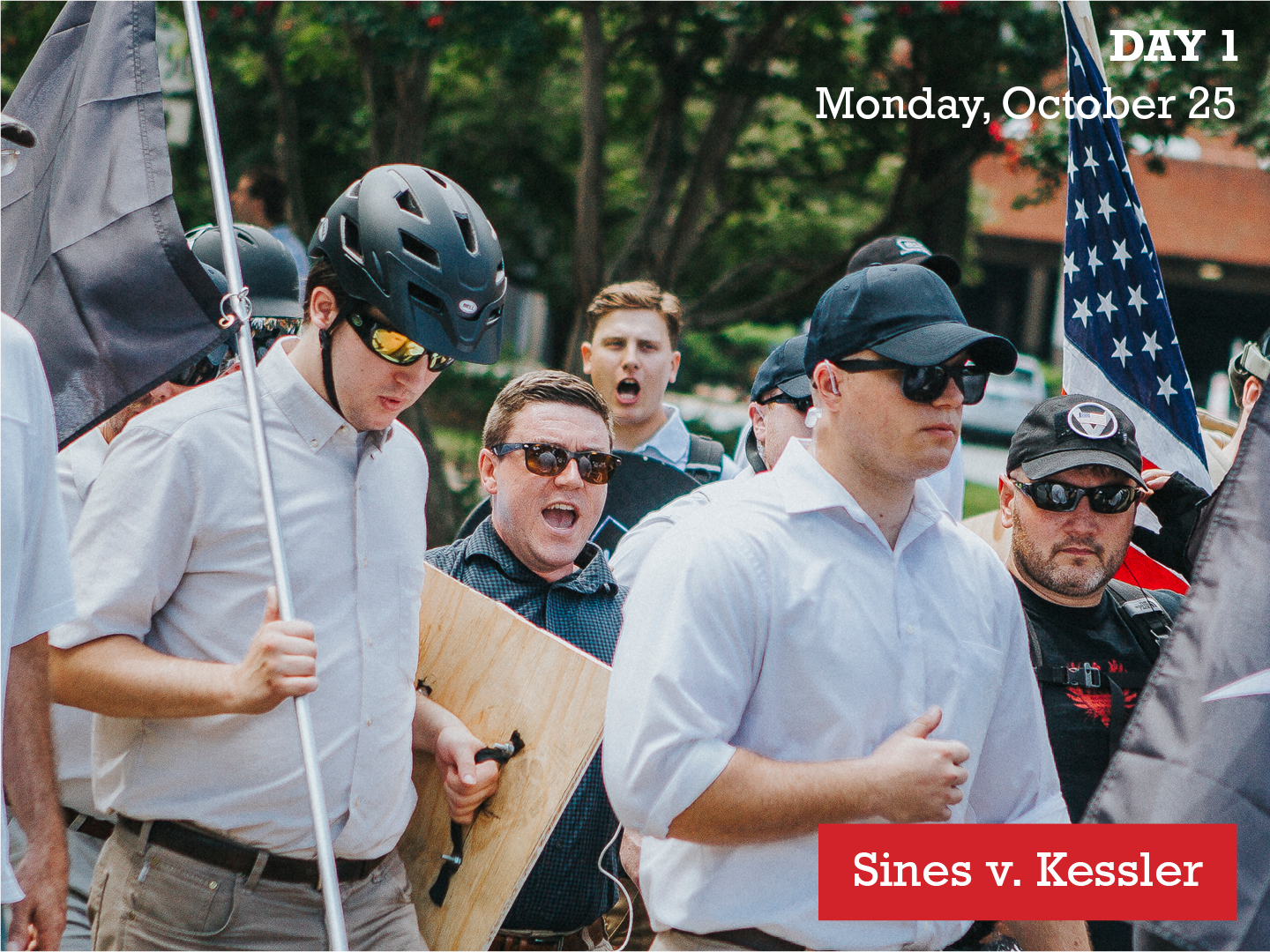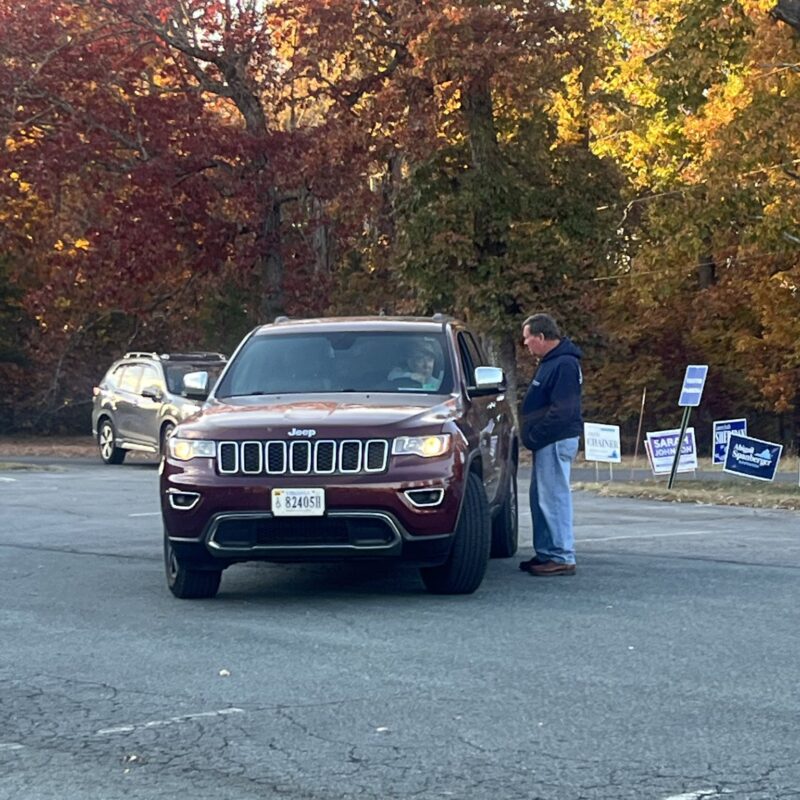Each day, we’ll have the latest news from the courtroom in the Sines v. Kessler Unite the Right trial. For coverage from previous days, check the list of links at the bottom of this page.
With heightened security outside the courthouse, the courtroom closed to the public, and media restricted to a live feed of proceedings in a separate room inside the federal court building in downtown Charlottesville, Sines v. Kessler got underway on Monday morning. The lawsuit is aimed at disrupting and bankrupting the hate groups responsible for the August 2017 Unite the Right rally. Difficulty seating a jury in the civil case emerged almost immediately.
“These people are terrorists,” said the first prospective juror questioned in court about his ability to be objective about the defendants, a who’s who of white supremacists and neo-Nazis.
“Do you think you can set aside that opinion,” asked presiding Judge Norman K. Moon.
“I’m sorry, but I don’t think I can,” the man replied, prompting Moon to release him from the jury pool.
Moon released another prospective juror over advanced age and a heart condition (jury service is optional for those 70 and over). Several others who are self-employed requested release from jury service due to the length of the trial, which is scheduled to last four weeks. The court also released a school bus driver who noted that the nationwide shortage in her field would make a four-week absence a hardship for students.
By mid-afternoon, 12 prospective jurors had been questioned and nine had been released for reasons ranging from age and health to self-professed bias. As court wrapped up at 6pm, several more had survived challenges from the defense or plaintiffs.
The plaintiffs in the case are represented by a phalanx of high-powered attorneys led by Roberta Kaplan and funded by the nonprofit Integrity First for America. Kaplan is best known for her 2013 victory in the landmark Supreme Court case United States v. Windsor, a watershed moment in the quest for marriage equality.
On the opposite side of the courtroom, several attorneys representing defendants were present, while Christopher Cantwell and alt-right leader Richard Spencer represented themselves.
Negative views of Nazis and white supremacists were frequent among the prospective jury pool but weren’t the only strong feelings expressed.
“You have unfavorable views against antifa?” Moon said to a female prospective juror.
“Honestly, I think they’re all a terrorist organization. They’re trying to hurt people,” the woman responded.
“Realizing that all the plaintiffs will say they are not members of that organization, do you think you can give the plaintiffs a fair hearing and make decisions based on law and evidence?” Moon asked.
“Yes,” the woman replied.
While jury selection took the majority of the time on Monday, the day started with a motion by plaintiffs to sever the case for Cantwell. If granted, the motion would create a separate lawsuit with Cantwell as the only defendant.
“The reason why we’ve done it just now is we were here for the first time with Mr. Cantwell, and we saw how he was given documents that he had never seen before,” said Kaplan. Kaplan noted that Cantwell’s present incarceration for threatening rape has prevented timely communication with him.
“It’s not about any newfound empathy for Mr. Cantwell,” said Kaplan. “There does appear to be an issue with respect to Mr. Cantwell getting pleadings in this case, documents in real time.”
Requesting the court’s permission to speak, Cantwell, who earned the moniker “the crying Nazi” after the Unite the Right rally for a self-posted video of him weeping over his impending arrest, asked the court to sanction the plaintiffs, but Moon swiftly interrupted.
“The court is willing to sever the case and allow you the time you want for your case,” said Moon. He denied the plaintiffs’ motion after Cantwell told the court he didn’t want his own legal proceeding.
Sines v. Kessler accuses Cantwell and two dozen other individuals and groups of conspiring to commit racially motivated violence before and during the weekend of the Unite the Right rally in August 2017. Defendants include the KKK, Vanguard America, League of the South and the National Socialist Movement. Individual defendants include rally organizer Jason Kessler, anti-Semitic conspiracy theorist Elliott Kline (aka Eli Mosley), Matthew Heimbach, who co-founded the Traditionalist Worker Party with fellow lawsuit defendant Matthew Parrott, and James Fields, who was convicted of murder and maiming in the August 12 car attack.
The suit’s ambitious goal goes beyond simply punishing individuals; it seeks to financially cripple groups and people who promote bigotry, hate, and violence, preventing future Unite the Right-like rallies in Charlottesville or anywhere else in the country.
Jury selection will continue into Tuesday.
Previous Sines v. Kessler coverage
Pre-trial: Their day in court: Major lawsuit against Unite the Right neo-Nazis heads to trial






